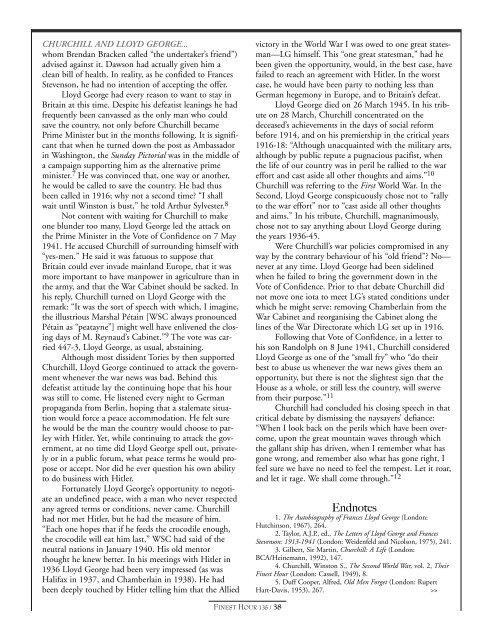Create successful ePaper yourself
Turn your PDF publications into a flip-book with our unique Google optimized e-Paper software.
CHURCHILL AND LLOYD GEORGE...whom Brendan Bracken called “the undertaker’s friend”)advised against it. Dawson had actually given him aclean bill of health. In reality, as he confided to FrancesStevenson, he had no intention of accepting the offer.Lloyd George had every reason to want to stay inBritain at this time. Despite his defeatist leanings he hadfrequently been canvassed as the only man who couldsave the country, not only before <strong>Churchill</strong> becamePrime Minister but in the months following. It is significantthat when he turned down the post as Ambassadorin Washington, the Sunday Pictorial was in the middle ofa campaign supporting him as the alternative primeminister. 7 He was convinced that, one way or another,he would be called to save the country. He had thusbeen called in 1916; why not a second time? “I shallwait until <strong>Winston</strong> is bust,” he told Arthur Sylvester. 8Not content with waiting for <strong>Churchill</strong> to makeone blunder too many, Lloyd George led the attack onthe Prime Minister in the Vote of Confidence on 7 May1941. He accused <strong>Churchill</strong> of surrounding himself with“yes-men.” He said it was fatuous to suppose thatBritain could ever invade mainland Europe, that it wasmore important to have manpower in agriculture than inthe army, and that the War Cabinet should be sacked. Inhis reply, <strong>Churchill</strong> turned on Lloyd George with theremark: “It was the sort of speech with which, I imagine,the illustrious Marshal Pétain [WSC always pronouncedPétain as “peatayne”] might well have enlivened the closingdays of M. Reynaud’s Cabinet.” 9 The vote was carried447-3, Lloyd George, as usual, abstaining.Although most dissident Tories by then supported<strong>Churchill</strong>, Lloyd George continued to attack the governmentwhenever the war news was bad. Behind thisdefeatist attitude lay the continuing hope that his hourwas still to come. He listened every night to Germanpropaganda from Berlin, hoping that a stalemate situationwould force a peace accommodation. He felt surehe would be the man the country would choose to parleywith Hitler. Yet, while continuing to attack the government,at no time did Lloyd George spell out, privatelyor in a public forum, what peace terms he would proposeor accept. Nor did he ever question his own abilityto do business with Hitler.Fortunately Lloyd George’s opportunity to negotiatean undefined peace, with a man who never respectedany agreed terms or conditions, never came. <strong>Churchill</strong>had not met Hitler, but he had the measure of him.“Each one hopes that if he feeds the crocodile enough,the crocodile will eat him last,” WSC had said of theneutral nations in January 1940. His old mentorthought he knew better. In his meetings with Hitler in1936 Lloyd George had been very impressed (as wasHalifax in 1937, and Chamberlain in 1938). He hadbeen deeply touched by Hitler telling him that the Alliedvictory in the World War I was owed to one great statesman—LGhimself. This “one great statesman,” had hebeen given the opportunity, would, in the best case, havefailed to reach an agreement with Hitler. In the worstcase, he would have been party to nothing less thanGerman hegemony in Europe, and to Britain’s defeat.Lloyd George died on 26 March 1945. In his tributeon 28 March, <strong>Churchill</strong> concentrated on thedeceased’s achievements in the days of social reformbefore 1914, and on his premiership in the critical years1916-18: “Although unacquainted with the military arts,although by public repute a pugnacious pacifist, whenthe life of our country was in peril he rallied to the wareffort and cast aside all other thoughts and aims.” 10<strong>Churchill</strong> was referring to the First World War. In theSecond, Lloyd George conspicuously chose not to “rallyto the war effort” nor to “cast aside all other thoughtsand aims.” In his tribute, <strong>Churchill</strong>, magnanimously,chose not to say anything about Lloyd George duringthe years 1936-45.Were <strong>Churchill</strong>’s war policies compromised in anyway by the contrary behaviour of his “old friend”? No—never at any time. Lloyd George had been sidelinedwhen he failed to bring the government down in theVote of Confidence. Prior to that debate <strong>Churchill</strong> didnot move one iota to meet LG’s stated conditions underwhich he might serve: removing Chamberlain from theWar Cabinet and reorganising the Cabinet along thelines of the War Directorate which LG set up in 1916.Following that Vote of Confidence, in a letter tohis son Randolph on 8 June 1941, <strong>Churchill</strong> consideredLloyd George as one of the “small fry” who “do theirbest to abuse us whenever the war news gives them anopportunity, but there is not the slightest sign that theHouse as a whole, or still less the country, will swervefrom their purpose.” 11<strong>Churchill</strong> had concluded his closing speech in thatcritical debate by dismissing the naysayers’ defiance:“When I look back on the perils which have been overcome,upon the great mountain waves through whichthe gallant ship has driven, when I remember what hasgone wrong, and remember also what has gone right, Ifeel sure we have no need to feel the tempest. Let it roar,and let it rage. We shall come through.” 12Endnotes1. The Autobiography of Frances Lloyd George (London:Hutchinson, 1967), 264.2. Taylor, A.J.P., ed., The Letters of Lloyd George and FrancesStevenson: 1913-1941 (London: Weidenfeld and Nicolson, 1975), 241.3. Gilbert, Sir Martin, <strong>Churchill</strong>: A Life (London:BCA/Heinemann, 1992), 147.4. <strong>Churchill</strong>, <strong>Winston</strong> S., The Second World War, vol. 2, TheirFinest Hour (London: Cassell, 1949), 8.5. Duff Cooper, Alfred, Old Men Forget (London: RupertHart-Davis, 1953), 267. >>FINEST HOUR 135 / 38

















